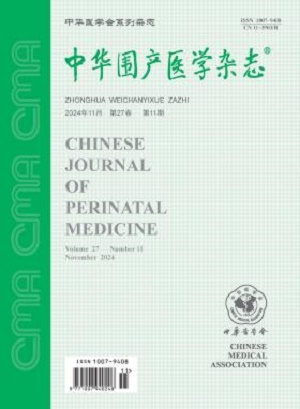Asymptomatic COVID-19 infection in pregnant woman in the third trimester: a case report/ 中华围产医学杂志
Q4 Medicine
引用次数: 9
Abstract
We report a case of asymptomatic COVID-19 infection in a pregnant woman in the third trimester with good maternal and infant outcomes. The patient was admitted to the Second People's Hospital of Hefei on February 11, 2020, because of a "positive novel coronavirus nucleic acid test result for one day" at 38 weeks of gestation. No abnormality was observed during her previous regular prenatal examinations. A throat swab sample was obtained from the patient four days before admission due to the diagnosis of COVID-19 infection in her husband and sister on the 14th and 7th day before her admission, and the new coronavirus nucleic acid test showed positive. The patient reported no discomfort before admission. Chest CT on the 3rd after admission showed a small amount of bilateral pleural effusion. Irregular contractions occurred three days after admission and labor was considered to be imminent. An emergency cesarean section was performed and the patient delivered a live baby girl. No tests were performed on amniotic fluid, cord blood or placenta for new coronavirus nuclei acid. The patient was isolated from the infant without breastfeeding after surgery. All medical staff involved in the cesarean section were isolated after surgery. Neonatal peripheral blood and nasopharyngeal swabs were collected for the new coronavirus nucleic acid tests on the day of birth and one day of age respectively, and nasopharyngeal swabs and anal suabs were taken at nine days after birth. All test results were negative. The patient recovered well after surgery with stable vital signs. Chest CT on the 8th after operation showed a small amount of bilateral pleural effusion, while the new coronavirus nucleic acid test results of the pharyngeal swabs were positive on the 11th and 12th day after operation. The throat swabs of all medical staff involved in the operation were negative 14 days after the operation. The mother and baby were discharged 14 days after the Cesarean section.妊娠晚期无症状COVID-19感染1例
我们报告了一例无症状新冠肺炎感染病例,该病例发生在一名妊娠晚期的孕妇身上,其母婴结果良好。患者于2020年2月11日入住合肥市第二人民医院,原因是在妊娠38周时“新型冠状病毒核酸检测结果呈一天阳性”。在她之前的定期产前检查中没有发现异常。患者入院前4天,因入院前14天和7天其丈夫和姐姐被诊断为新冠肺炎感染,采集咽拭子样本,新冠病毒核酸检测呈阳性。患者入院前报告没有任何不适。入院后3日胸部CT显示双侧少量胸腔积液。入院后三天出现不规则宫缩,分娩被认为迫在眉睫。进行了紧急剖宫产手术,患者产下了一名活女婴。没有对羊水、脐带血或胎盘进行新冠病毒核酸检测。手术后,患者在没有母乳喂养的情况下与婴儿隔离。所有参与剖宫产手术的医护人员在手术后均被隔离。分别在出生当天和出生一天采集新生儿外周血和鼻咽拭子进行新冠病毒核酸检测,并在出生后9天采集鼻咽拭子和肛门拭子。所有检测结果均为阴性。病人手术后恢复良好,生命体征稳定。术后8日胸部CT显示双侧少量胸腔积液,术后11、12日咽拭子新冠病毒核酸检测结果均为阳性。所有参与手术的医护人员在手术后14天的咽拭子检测结果均为阴性。母亲和婴儿在剖腹产14天后出院。
本文章由计算机程序翻译,如有差异,请以英文原文为准。
求助全文
约1分钟内获得全文
求助全文
来源期刊

中华围产医学杂志
Medicine-Obstetrics and Gynecology
CiteScore
0.70
自引率
0.00%
发文量
4446
期刊介绍:
Chinese Journal of Perinatal Medicine was founded in May 1998. It is one of the journals of the Chinese Medical Association, which is supervised by the China Association for Science and Technology, sponsored by the Chinese Medical Association, and hosted by Peking University First Hospital. Perinatal medicine is a new discipline jointly studied by obstetrics and neonatology. The purpose of this journal is to "prenatal and postnatal care, improve the quality of the newborn population, and ensure the safety and health of mothers and infants". It reflects the new theories, new technologies, and new progress in perinatal medicine in related disciplines such as basic, clinical and preventive medicine, genetics, and sociology. It aims to provide a window and platform for academic exchanges, information transmission, and understanding of the development trends of domestic and foreign perinatal medicine for the majority of perinatal medicine workers in my country.
 求助内容:
求助内容: 应助结果提醒方式:
应助结果提醒方式:


